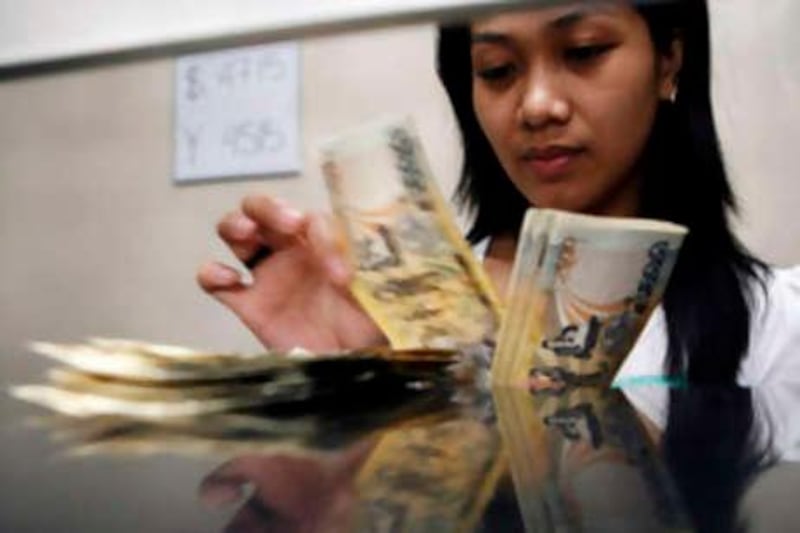The US Treasury Secretary Henry Paulson warned US politicians they had to act fast after the House rejected his US$700 billion (Dh2.57 trillion) bank bailout, triggering panic selling as the global financial crisis deepened. Stock markets around the world plunged after US House members, wary an angry public will punish them on Election Day five weeks from now, voted 228 to 205 to shoot down what would be the biggest government bailout in history. US stocks lost one trillion dollars in value in one day for the first time ever. Markets across Asia and Europe also fell steeply, as the House defied warnings that the entire world was waiting for the United States to act. "Markets around the world are under stress," said Mr Paulson, the architect of the audacious proposal to buy up the mountains of bad mortgage-related debt behind a wave of home foreclosures and spectacular bank failures. "We need to get something done," he said. "This is much too important to simply let fail." George W Bush said the economic damage to the US will be "painful and lasting" and urged Congress to pass the bailout bill. US stocks and European shares recovered today, after Mr Bush's remarks, struggling back from Wall Street's worst slide in more than 20 years, as investors bet that Washington would find a way to pass a plan to stabilise the US financial sector despite today's defeat. Investors snapped up beaten-down shares across the board, with shares of financial companies, including JPMorgan Chase, up nearly 12 per cent, among the standouts. Stronger-than-expected economic reports, including a reading on consumer confidence, added to the positive sentiment. The Dow Jones industrial average rose 277.49 points, or 2.68 per cent, to 10,642.94. The Standard & Poor's 500 Index climbed 37.39 points, or 3.38 per cent, to 1,143.78. The Nasdaq Composite Index gained 64.22 points, or 3.24 per cent, to 2,047.95. But European stock markets closed higher, getting a boost from the rebound on Wall Street. In London, the FTSE 100 index of leading shares finished with a gain of 1.74 per cent to 4,902.45 points, the Paris CAC 40 rose 1.99 per cent to 4.032.10 points and Frankfurt's DAX added 0.41 per cent to 5,831.02 points. Despite fears the stability of the global financial system is at stake, House politicians appeared to heed widespread public sentiment that the US taxpayer should not suffer for the mistakes and greed of Wall Street's bankers. But the Australian prime minister Kevin Rudd said the fallout was being felt around the world, and that he and other US allies would press Washington to take action after what he called the "bad development" of the House vote. "This is necessary for the stabilisation of US financial markets and necessary for stabilisation of global financial markets," Mr Rudd said. "We intend to be arguing this case strongly - robustly - in the days ahead." The crisis has its roots in a wave of loans to would-be US homebuyers with spotty credit histories. Once people began to default on these so-called subprime mortgages, a chain reaction of chaos ensued. Housing foreclosures sent home values plunging, and the US housing market fell apart. Meanwhile the loans themselves had been re-packaged as complicated investment products and resold. As bank after bank realised the extent of its investment in these bad debts, they saw they had less money available to make new loans while their own share prices began to collapse - and the global meltdown began. Under the Paulson plan, the US government would buy up to 700 billion dollars of bad mortgage-related assets from banks, wiping the dodgy debts from their balance sheets and freeing them up to start lending robustly again. But with the election five weeks away, the House of Representatives - whose members must be re-elected every two years - voted down the plan, despite a reported informal agreement on Capitol Hill that it would pass. David Obey, a Democrat from the state of Wisconsin, said: "Evidently some of those guys would rather lose an economy than lose an election." Many Americans, feeling the pinch from a weak economy and high oil prices, oppose footing the bill. In particular, many free-market conservatives see the rescue as "socialist" and destined to cause more trouble ahead. *Reuters and AFP
Bailout failure shockwaves hit world markets
Global financial crisis deepens after US$700 billion bank bailout was rejected by US politicians.

More from the national





